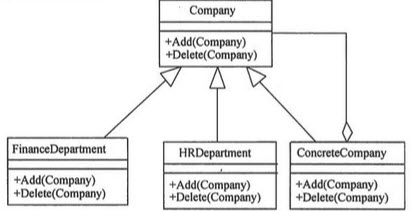
创建自己的小题库
搜索
【单选题】


(1)处应填()。
A.fl.java
B.\Document\Java-prog\f1.java
C.D:\Program\Java-prog\f1.java
D.\Program\Java-prog\f1.java
A.
若某文件系统的目录结构如下图所示,假设用户要访问文件f1.java,且当前工作目录为Program,则该文件的全文件名为(1),其相对路径为(2)。
B.



 分享
分享
 反馈
反馈 收藏
收藏 举报
举报参考答案:


举一反三
【单选题】(2)处应填()。 A.V(S1)V(S2)、P(S1)和v(S3)V(S4) B.P(S1)V(S2)、P(S1)和P(S2)V(S1) C.V(S1)V(S2)、P(S1)和P(S3)P(S4) D.P(S1)P(S2)、V(S1)和P(S3)V(S2)
A.
进程Pl、P2、P3、P4和P5的前趋图如下:
B.


C.
若用PV操作控制进程P1~P5并发执行的过程,则需要设置5个信号量S1、S2、S3、S4和S5,进程间同步所使用的信号量标注在上图中的边上,且信号量S1~S5的初值都等于零,初始状态下进程P1 开始执行。下图中a、b和c处应分别填写(2);d和e处应分别填写(3),f和g处应分别填写(4)。
D.


【单选题】(45)处应填()。 A.架构风格 B.开发方法 C.设计模式 D.分析模式
A.
(44) 描述了一类软件架构的特征,它独立于实际问题,强调软件系统中通用的组织结构选择。垃圾回收机制是Java语言管理内存资源时常用的一种 (45) 。
【单选题】(71)处应填()。 A.an application architecture B.a distributed system C.a system scope D.a system physical model
A.
Information systems design is defined as those tasks that focus on the specification of a detailed computer-based solution. Typically, there are four systems design tasks for in-house development.
B.
1) The first task is to specify (71) ,which defines the technologies to be used by one, more, or all information systems in terms of their data, processes, interfaces, and network components. This task is accomplished by analyzing the data models and process models that are initially created during requirements analys16.
C.
2) The next systems design task is to develop the (72) . The purpose of this task is to prepare technical design specifications for a database that will be adaptable to future requirements and expansion.
D.
3) Once the database prototype has been built, the systems designer can work closely with system users to develop input, output and dialogue specifications. The (73) must be specified to ensure that the outputs are not lost, misrouted, misused, or incomplete.
E.
4) The fourth design task involves packaging all the specifications from the previous design tasks into a set of specifications that will guide the (74) activities during the following phases of the systems development methodology.
F.
Finally, we should (75) and update the project plan accordingly. The key deliverable should include a detailed plan for the construction phase that should follow.
【单选题】(34)处应填()。 A.Company B.Finance Department C.HR Department D.Concrete Company
A.
某公司欲开发一门户网站,将公司的各个分公司及办事处信息进行整合。现决定采用Composite设计模式来实现公司的组织结构关系,并设计了如下图所示的UML类图。图中与Composite模式中的“Component”角色相对应的类是 (33) ,与“Composite”角色相对应的类是 (34) 。
B.


【单选题】(19)处应填()。 A.数据网关 B.主动记录 C.包装器 D.数据映射
A.
某企业欲对内部的数据库进行数据集成。如果集成系统的业务逻辑较为简单,仅使用数据库中的单表数据即可实现业务功能,这时采用 (18) 方式进行数据交换与处理较为合适;如果集成系统的业务逻辑较为复杂,并需要通过数据库中不同表的连接操作获取数据才能实现业务功能,这时采用 (19) 方式进行数据交换与处理较为合适。
【单选题】(60)处应填()。 A.信息隐藏 B.内置监控器 C.限制访问 D.检查点
A.
软件质量属性通常需要采用特定的设计策略实现。例如, (58) 设计策略能提高该系统的可用性, (59) 设计策略能够提高该系统的性能, (60) 设计策略能够提高该系统的安全性。
【单选题】(48)处应填()。 A.逻辑视图 B.用例视图 C.过程视图 D.开发视图
A.
1995年Kruchten提出了著名的“4+1”视图,用来描述软件系统的架构。在“4+1”视图中, (46) 用来描述设计的对象模型和对象之间的关系; (47) 描述了软件模块的组织与管理; (48) 描述设计的并发和同步特征。
【单选题】(63)处应填()。 A.敏感点 B.风险点 C.非风险点 D.权衡点
A.
识别风险点、非风险点、敏感点和权衡点是软件架构评估过程中的关键步骤。针对某系统所作的架构设计中,“系统需要支持的最大并发用户数量直接影响传输协议和数据格式”描述了系统架构设计中的一个 (62) ;“由于系统的业务逻辑目前尚不清楚,因此现有系统三层架构中的第二层可能会出现功能重复,这会影响系统的可修改性”描述了系统架构设计中的一个 (63) 。

相关题目:
【单选题】(2)处应填()。 A.V(S1)V(S2)、P(S1)和v(S3)V(S4) B.P(S1)V(S2)、P(S1)和P(S2)V(S1) C.V(S1)V(S2)、P(S1)和P(S3)P(S4) D.P(S1)P(S2)、V(S1)和P(S3)V(S2)
A.
进程Pl、P2、P3、P4和P5的前趋图如下:
B.


C.
若用PV操作控制进程P1~P5并发执行的过程,则需要设置5个信号量S1、S2、S3、S4和S5,进程间同步所使用的信号量标注在上图中的边上,且信号量S1~S5的初值都等于零,初始状态下进程P1 开始执行。下图中a、b和c处应分别填写(2);d和e处应分别填写(3),f和g处应分别填写(4)。
D.


【单选题】(45)处应填()。 A.架构风格 B.开发方法 C.设计模式 D.分析模式
A.
(44) 描述了一类软件架构的特征,它独立于实际问题,强调软件系统中通用的组织结构选择。垃圾回收机制是Java语言管理内存资源时常用的一种 (45) 。
【单选题】(71)处应填()。 A.an application architecture B.a distributed system C.a system scope D.a system physical model
A.
Information systems design is defined as those tasks that focus on the specification of a detailed computer-based solution. Typically, there are four systems design tasks for in-house development.
B.
1) The first task is to specify (71) ,which defines the technologies to be used by one, more, or all information systems in terms of their data, processes, interfaces, and network components. This task is accomplished by analyzing the data models and process models that are initially created during requirements analys16.
C.
2) The next systems design task is to develop the (72) . The purpose of this task is to prepare technical design specifications for a database that will be adaptable to future requirements and expansion.
D.
3) Once the database prototype has been built, the systems designer can work closely with system users to develop input, output and dialogue specifications. The (73) must be specified to ensure that the outputs are not lost, misrouted, misused, or incomplete.
E.
4) The fourth design task involves packaging all the specifications from the previous design tasks into a set of specifications that will guide the (74) activities during the following phases of the systems development methodology.
F.
Finally, we should (75) and update the project plan accordingly. The key deliverable should include a detailed plan for the construction phase that should follow.
【单选题】(34)处应填()。 A.Company B.Finance Department C.HR Department D.Concrete Company
A.
某公司欲开发一门户网站,将公司的各个分公司及办事处信息进行整合。现决定采用Composite设计模式来实现公司的组织结构关系,并设计了如下图所示的UML类图。图中与Composite模式中的“Component”角色相对应的类是 (33) ,与“Composite”角色相对应的类是 (34) 。
B.


【单选题】(19)处应填()。 A.数据网关 B.主动记录 C.包装器 D.数据映射
A.
某企业欲对内部的数据库进行数据集成。如果集成系统的业务逻辑较为简单,仅使用数据库中的单表数据即可实现业务功能,这时采用 (18) 方式进行数据交换与处理较为合适;如果集成系统的业务逻辑较为复杂,并需要通过数据库中不同表的连接操作获取数据才能实现业务功能,这时采用 (19) 方式进行数据交换与处理较为合适。
【单选题】(60)处应填()。 A.信息隐藏 B.内置监控器 C.限制访问 D.检查点
A.
软件质量属性通常需要采用特定的设计策略实现。例如, (58) 设计策略能提高该系统的可用性, (59) 设计策略能够提高该系统的性能, (60) 设计策略能够提高该系统的安全性。
【单选题】(48)处应填()。 A.逻辑视图 B.用例视图 C.过程视图 D.开发视图
A.
1995年Kruchten提出了著名的“4+1”视图,用来描述软件系统的架构。在“4+1”视图中, (46) 用来描述设计的对象模型和对象之间的关系; (47) 描述了软件模块的组织与管理; (48) 描述设计的并发和同步特征。
【单选题】(63)处应填()。 A.敏感点 B.风险点 C.非风险点 D.权衡点
A.
识别风险点、非风险点、敏感点和权衡点是软件架构评估过程中的关键步骤。针对某系统所作的架构设计中,“系统需要支持的最大并发用户数量直接影响传输协议和数据格式”描述了系统架构设计中的一个 (62) ;“由于系统的业务逻辑目前尚不清楚,因此现有系统三层架构中的第二层可能会出现功能重复,这会影响系统的可修改性”描述了系统架构设计中的一个 (63) 。

参考解析:


AI解析
重新生成

题目纠错 0
发布

 复制链接
复制链接 新浪微博
新浪微博 分享QQ
分享QQ 微信扫一扫
微信扫一扫





